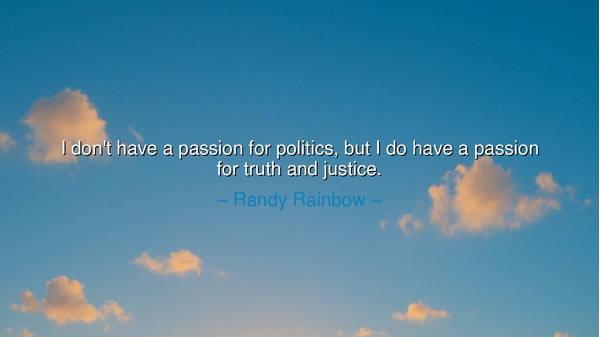
I don't have a passion for politics, but I do have a passion for






Hear the words of Randy Rainbow, spoken with clarity of heart: “I don’t have a passion for politics, but I do have a passion for truth and justice.” This statement, though simple, holds a wisdom as old as civilization itself. For it reminds us that the pursuit of righteousness is not bound to the games of power, nor is it confined to the halls of rulers. Politics may concern itself with factions, strategies, and ambition, but truth and justice belong to all, and they are eternal.
The origin of such words lies in the weariness that many feel when confronted with the endless quarrels of politics. Leaders rise and fall, promises are spoken and broken, and often the people are left disillusioned. Yet in this chaos, there remains a higher calling—the eternal pursuit of truth and the defense of justice. Rainbow’s declaration is a reminder that one need not be enthralled by the shifting tides of political power in order to live as a defender of what is right. For truth and justice are not the property of kings or parties; they are the inheritance of humankind.
History bears witness to this. Consider the life of Mahatma Gandhi. He held no political office, nor did he hunger for the trappings of power. His passion was not for politics as such, but for truth—what he called satyagraha, the force of truth—and for justice, especially for the poor and oppressed. By living his passion, he shook an empire and liberated a nation. His story proves that it is possible to serve humanity not by seeking political power, but by standing unshakably for what is right.
So too with Harriet Tubman, who was neither politician nor general, yet whose unwavering commitment to justice led her to guide countless slaves to freedom through the Underground Railroad. She did not write laws, nor did she sit in councils of state, yet her life bore witness that a passion for truth and justice can change history more powerfully than decrees shouted from thrones. Her courage, born not of politics but of righteousness, gave light to generations.
This, then, is the heart of Rainbow’s words: you need not be swept into the quarrels of parties or the thirst for power in order to live a life of impact. Instead, you must anchor yourself in truth, and let justice be the compass that guides your steps. Where politics divides, truth unites; where politics shifts like sand, justice stands like a rock. To devote yourself to these is to walk a higher path, one that transcends the noise of the hour and speaks to the eternal.
The lesson is plain, O children of tomorrow: do not despise politics, for it shapes the world in which we live, but do not confuse it with the highest calling. Your loyalty must be first to truth—to speak it, to seek it, even when it is unpopular. And your devotion must be to justice—to defend the weak, to uplift the oppressed, to act with fairness even when it costs you. For these things endure, while the factions of men rise and fall like leaves in the wind.
Therefore, in your daily life, practice this discipline: measure your words by truth, and your deeds by justice. When you see corruption, expose it. When you see oppression, resist it. When you are tempted to remain silent, remember that silence often serves the unjust. Do not wait for rulers to act, but act as one whose heart burns with eternal fire. In this way, you will join the company of those who, like Gandhi and Tubman, changed the world not by pursuing politics, but by serving the higher law of righteousness.
Thus remember Rainbow’s declaration, and take it as your own: let not your passion be consumed by the fleeting struggles of politics, but let it blaze for the immortal pillars of truth and justice. In this, you will live a life that is not only meaningful, but eternal in its echo.






ANDieu Anh Nguyen
This quote resonates with me because it highlights the idea that truth and justice transcend political affiliations. It’s easy to get lost in the noise of political agendas, but if we prioritize truth and fairness, maybe we’d find common ground. Can you still make a significant impact on these values without engaging deeply in politics? Perhaps our focus should be more on integrity and ethics than on political sides.
L7Pham Minh Khoi Lop 7/4
Rainbow’s quote is a reminder that we don’t have to love politics to care about truth and justice. So many people feel that they must engage in political discourse to make a difference, but maybe the key is staying focused on the values we care about most. What if we redirected our energy toward actions that promote fairness and truth rather than getting caught in the political turmoil? Could we achieve more through collective compassion?
CHChristian Ho
I love how Rainbow distinguishes between having a passion for politics and a passion for truth and justice. It’s so easy to get wrapped up in the drama of politics, but focusing on principles like truth and justice feels more enduring. How often do we let political opinions cloud our judgment of what’s right and fair? Can we push for truth and justice in a world where politics often complicates those efforts?
VKVuong Khanh
Randy Rainbow's quote makes me think about the importance of separating political passion from a passion for truth and justice. Politics can often be divisive and messy, but truth and justice are universal values. It’s refreshing to hear someone focus on these ideals rather than getting caught up in partisan debates. But how can we effectively advocate for truth and justice without getting involved in the political system that shapes those issues?